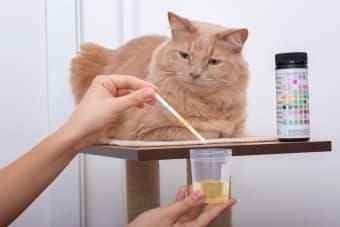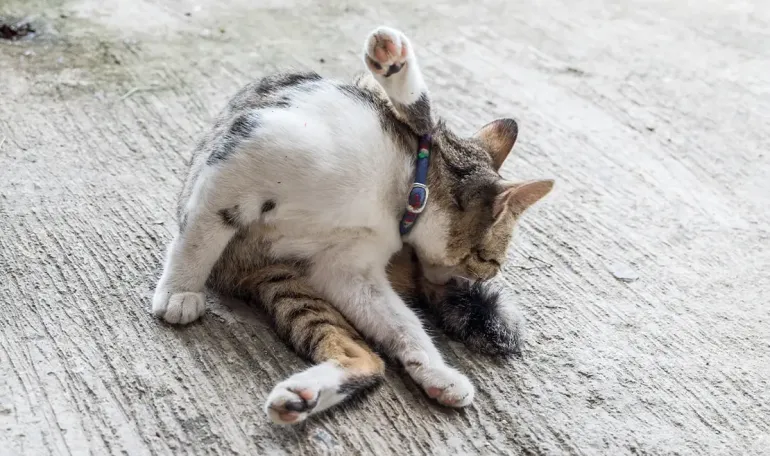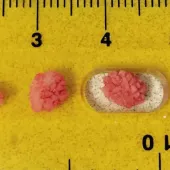Cystitis (bladder inflammation) in cats : cause, treatment & prevention

Cystitis (bladder inflammation)
Anyone who has ever experienced cystitis, or a hurting bladder, is aware of how unpleasant the illness is. Cystitis is usually not fatal, but it can cause your pet much distress. As most cases are easily treated to give your pet quick relief, it is crucial to seek veterinarian help as soon as possible.

What is cystitis?
Cystitis means that the lining of the bladder is inflamed. Because the bladder is sore animals with cystitis want to empty it more often and so are frequently seen squatting and trying to pass urine.
What are the signs of cystitis?
More frequent visits to the litter tray by your cat is usually the first indication. They might only pass little amounts of urine when using a tray, and occasionally you will notice blood. Your cat may occasionally strain as though it is trying to pass pee, but nothing will come out. In certain situations, constipation or a urinary tract blockage may be misdiagnosed as cystitis. When trying to urinate, some cats with cystitis will cry, while others will only seem restless and uneasy.
Symptoms of Cystitis in Cats
Recognizing the signs of cystitis is crucial for early diagnosis and treatment. Common symptoms include:
-
Frequent Urination: Cats with cystitis may attempt to urinate more often than usual, producing only small amounts of urine each time.
-
Straining to Urinate: Cats may exhibit signs of discomfort while urinating, such as vocalizing, squatting for extended periods, or visible signs of effort.
-
Blood in Urine: Hematuria, or blood in the urine, is a common symptom of cystitis and indicates irritation of the urinary tract.
-
Urinating Outside the Litter Box: Cats suffering from cystitis might associate the litter box with pain and choose to urinate in other areas of the house.
-
Excessive Grooming: Cats may excessively lick their genital area in an attempt to soothe the discomfort caused by cystitis.

How will my vet know what is wrong with my cat?
Based on your description of the symptoms, your veterinarian will most likely think that your cat has a urinary tract issue. But before beginning treatment, it's crucial to rule out other possible issues (such a urinary tract blockage).
Your veterinarian will want to examine your cat first. Through palpation of the bladder and other organs, they may be able to determine the cause of the problem. Urine tests can determine whether the sample contains extra sugar, protein, or crystals, or if there is something else wrong. If there is an issue, a sample of pee may be sent to a lab to be cultured (grown bacteria). If bacteria do proliferate, testing can be performed to determine which antibiotics will work best to treat the infection. In the event that the issue recurs or does not resolve itself, your veterinarian might suggest an ultrasound or X-ray to check the bladder. Blood tests and other general tests may be performed if your pet exhibits symptoms of a general illness, such as fever or poor appetite.
Why has my cat got cystitis?
Stress is the most frequent cause of cystitis in cats. Some cats experience worry from even small adjustments to their routine, but this can also be evident stressors like a new family member or construction work underway. Infections by bacteria, which typically enter the body through the urethra (the tube that connects the bladder to the outside world) are less common in cats.
There are numerous issues that can increase your cat's risk of developing an infection-related cystitis. The bladder's inside may have been harmed in certain instances by a bladder stone. Cats who refuse to use their litter pan or have obstructions that make it difficult for them to relieve their bladder are also more vulnerable. Occasionally, the presence of another illness impairs your cat's ability to fight infection. Cystitis can be brought on by kidney disease, and cats with diabetes have high urine sugar levels, which encourages the growth of bacteria in the bladder.
Causes of Cystitis in Cats
Cystitis in cats can occur due to a variety of factors, including:
-
Bacterial Infections: Bacteria entering the urinary tract can lead to inflammation of the bladder lining.
-
Stress: Cats are sensitive animals, and changes in their environment, routine, or the introduction of new pets can cause stress, triggering cystitis.
-
Dietary Factors: Certain diets, especially those low in moisture content, can contribute to the formation of crystals in the urine, leading to inflammation.
-
Dehydration: Cats that do not drink enough water can develop concentrated urine, which irritates the bladder lining.
-
Urinary Stones: The presence of stones or crystals in the urinary tract can cause irritation and inflammation in the bladder.
How is cystitis treated?
Certain medications that assist relax the bladder and lessen the discomfort of passing pee can be prescribed by your veterinarian. Your veterinarian might prescribe an antibiotic course for you if your cat has bacterial cystitis and there are no other apparent health issues. Most of the time, the issue should go away a few days after the treatment begins. Even if your cat appears to be fully recovered, it is crucial that you keep giving the medicine until the entire course is completed. If you discontinue treatment too soon, the medication might not work again and the issue might resurface.
Treatment Options:
-
Pain Management: Pain relievers are often prescribed to alleviate discomfort and make the cat feel more at ease.
-
Dietary Changes: Specialized prescription diets with increased moisture content can help dissolve crystals and prevent their recurrence.
-
Hydration: Ensuring your cat has access to fresh, clean water at all times encourages dilute urine, which reduces irritation in the bladder.
-
Stress Reduction: Creating a calm and stable environment, especially if stress triggers the condition, can help manage and prevent cystitis.
-
Medications: In some cases, veterinarians may prescribe medications to relax the bladder and reduce inflammation.
Is there anything else I can do to help?
Keeping your cat's bladder empty on a regular basis will help it feel more comfortable. Ensure that they always have access to a fresh litter tray. The ideal number of litter trays in a home is one more than the number of cats. Urge your cat to drink lots of water, as this will assist the urine become less irritating to the bladder by diluting it. You can think about obtaining a drinking fountain for your cat, as they typically prefer to drink from metal or ceramic bowls rather than plastic ones. Feeding a moist (tinned) feed to cats who are prone to cystitis will stimulate water intake and dilute their urine.
You should make every effort to minimize stress in your cat's life if they have stress-related cystitis! Using a pheromone diffuser can also be beneficial.
Will my cat get better?
When they get cystitis, most cats recover extremely rapidly. But, if there is another issue that contributed to the cystitis, it needs to be resolved as well, or the illness will return without warning. Cats may occasionally require ongoing courses of antibiotics or permanent medicine for stress management if the underlying cause of their cystitis is not curable.
Conclusion
Cystitis in cats can cause significant discomfort, but with prompt veterinary care, appropriate treatment, and lifestyle adjustments, affected cats can experience relief and lead happy lives. Cat owners should be vigilant about their pets' behavior and seek immediate medical attention if any symptoms indicative of urinary issues are observed. By working closely with a veterinarian, cat owners can ensure their feline companions receive the best possible care and enjoy a high quality of life, free from the pain of cystitis.


